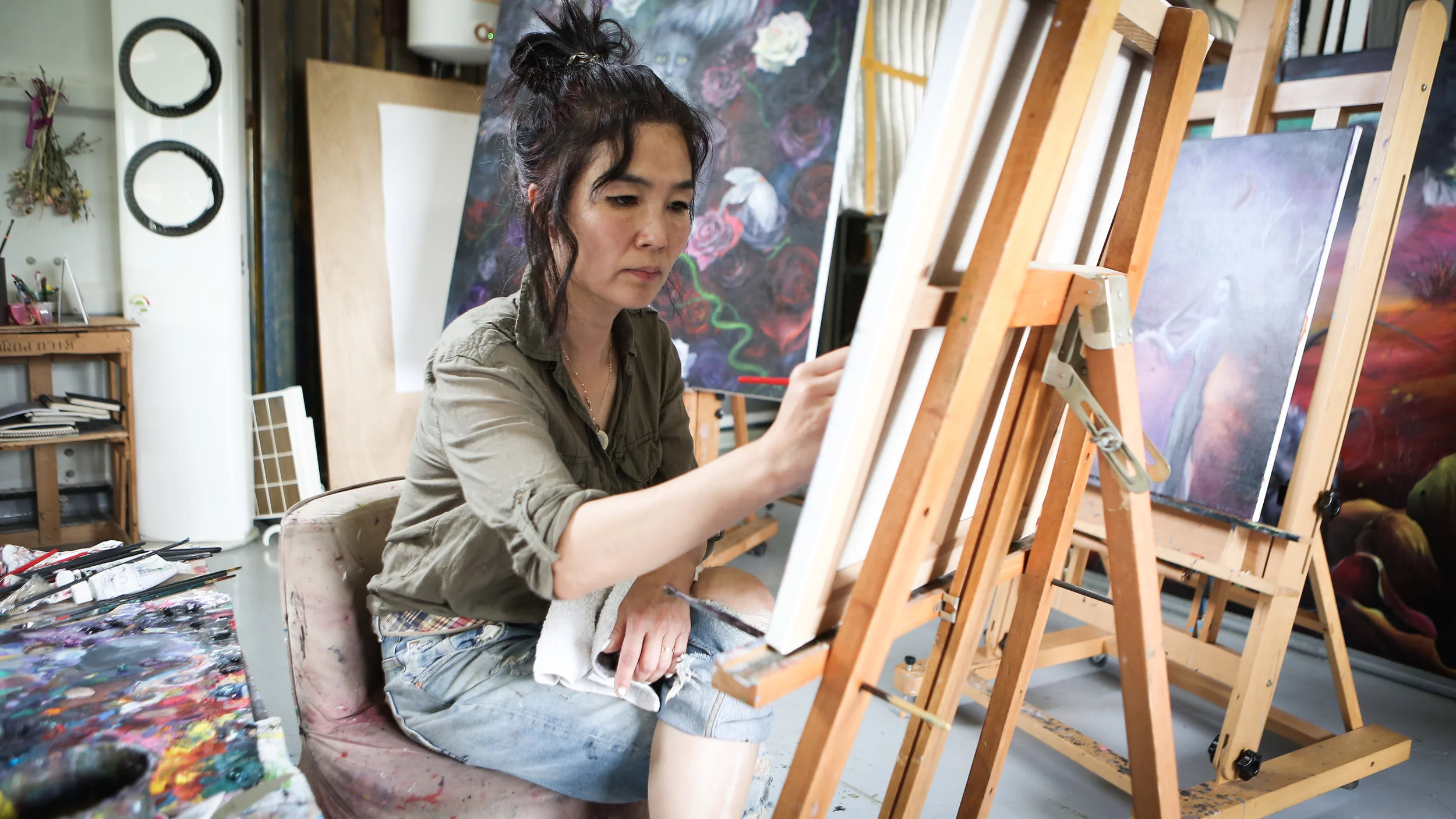Interview with Younghee Woo
Younghee Woo | South Korea
My work is based on the philosophical sense of life and death. It is the story of generation and extinction, for one exists as an extension of the other. During life time, we engage in organic relationships with the creations of nature. I empathize with them, and project my ego into them. Sometimes the form of evolution appears in my work and so does the mysterious being of unknown. The objects in my paintings are metaphors, and I like to leave these symbolic narratives open to interpretation. I hope the viewers of my paintings can appreciate the nobility of life, live fiercely and passionately, face the afterlife with grandness rather than fear, and even enjoy the futility of disappearing things.
The Ghost
Contemporary Art Station: Tell us about how you got started. When did you know you wanted to be an artist?
I have loved drawing since I was a child, and was outstanding. Naturally I had a vague dream that I would be a painter, and as I grew up, so did the dream. It was fascinating that I could keep a record of the things I want to express. Later on, I wanted to paint ‘good paintings’, my own style of paintings, and life without painting became meaningless.
CAS: What is your process like, from initial idea to the creation of the piece? Do you usually develop the idea for a project before you find the "canvas", or vice versa?
I had preferred quick intense paintings in the earlier times. Not all the work is done after esquisse. These days I make 30% of preparatory drawings and 70% is done on the canvas. My process requires long time due to modifying and painting over.
A Weaver
CAS: What do you love most about your creative process?
The process of story making is very interesting.
I definitely enjoy the part where I search images and fit them into the flow that will emphasize my intention so that the audience can feel it.
CAS: What role does art and the artist play in the broader social conversation today?
In these digitalized times, I feel that the deeply entrenched use of computer and mobile phone makes the quality of our lives lightweight, in a certain way.
We can say it’s a healthy society when the number of individuals who have profound thoughts and pursue spiritual as well as intellectual satisfaction increases.
Art is the climax of genuine value.
To be able to preserve one’s dignity in a materialistic world, the country must improve the quality of its culture and let the citizens enjoy it.
To elevate the quality of life of the public is to complete humanism.
And that is why the volume and weight of art has to grow.
CAS: Name a few of your favourite artists and influences.
Native Americans : All of the Native Americans are artists that I love, because the source of my paintings is ’nature and spirit’. They were not possessive, respected all creation, and did not separate death from life.
Zdzislaw Beksinski : He showed that it is possible to sublimate fear and darkness in art. I was encouraged by his work, in this Korean world of art where mostly bright and joyful stories are demanded.
Symbiosis, coexistence
CAS : What is the best advice you received as an artist?
A guitarist once told me that an artist needs to be well acquainted with not only literature and philosophy, but also science. Being myself with lack of scientific inquiries, I was thankful for his advice after a bit of contemplation. It will definitely enrich the stories in my work.
CAS: When did you discover your voice as an artist?
It was from the very first moment I started my work.
I drew what I wanted to draw. Paintings, as the record of silhouettes in my mind specified, put me on top of the world. But on the other hand, I am distressed to have the one masterpiece that I hadn’t come to paint yet.
I want to complete a painting that will calm down both joy and grief and balance in between them.
As my exhibitions continue, there is only one principle in my works. Any kind of creation - physical or spiritual - is destructed in the end. But then they are generated again, we just don’t know or don’t realize them. I imply that in my works. I draw the power of the circulation.
I did from the beginning.
CAS: What advice would you give to emerging artists trying to find their own?
An artist should have inner strength.
An artist should be brave.
One should also be righteous, know when to seclude oneself, and should not compromise.
An artist with pride is happy and satisfied just with one’s paintings even without recognition.
Thank you Younghee!




